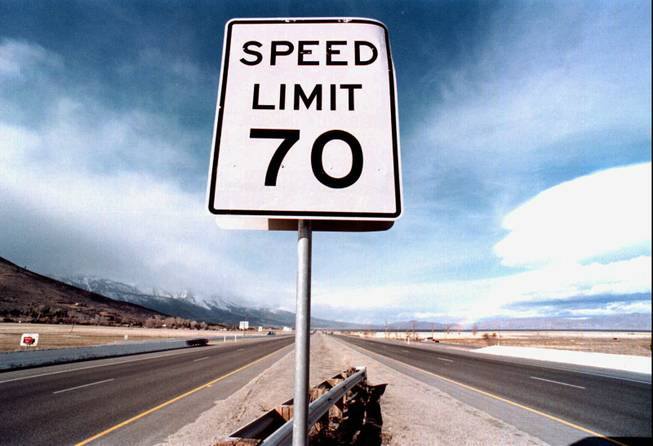
Associated Press File
A speed limit sign is a guide for motorists on U.S. 395 in Northern Nevada. State residents lead the nation in driving fewer miles per person.
Wednesday, Dec. 24, 2008 | 2 a.m.
Sun Archives
- The good in gas prices (7-1-2008)
- Editorial: A nation less driven (5-25-2007)
Beyond the Sun
Nevadans are leading a national trend among motorists: In the past two years, we’ve been putting in fewer miles behind the wheel.
And that’s more bad news for the state budget.
Our transportation projects are heavily dependent on gas tax receipts. Fewer miles driven means less gas bought — and fewer dollars for the highway fund.
As a result, the state is putting some roadway projects on hold, according to Tracy Larkin-Thomason, assistant director of planning and research at the Nevada Transportation Department.
The nation is experiencing the largest sustained decline in driving — and it began even before gasoline prices skyrocketed to $3, then more than $4 per gallon, a study by Washington-based Brookings Institution found.
From December 2006 to last September, Nevada motorists drove 7.3 percent fewer miles per person, the largest drop in the nation.
Nationwide, motorists drove 90 billion fewer miles from October 2007 to September, the largest driving drop in U.S. history.
The study did not attempt to explain why motorists drove fewer miles, but did report some of the decline can be attributed to an increased reliance on public transportation, which is at its highest since the 1950s.
In Las Vegas, the Regional Transportation Commission of Southern Nevada has reported an increase in ridership.
Because of less driving — and less gas tax paid — the Federal Highway Trust Fund took a $3 billion hit in revenue in fiscal 2008, according to a statement from Transportation Secretary Mary Peters.
“The uncertainty of future driving patterns on gas tax revenue will leave federal and state budget officials with an accounting tightrope when it comes to projecting their upcoming fiscal year budgets,” the study reported.
This is prompting Nevada to find alternatives to funding transportation projects.
“We’ve begun to look to see what the options are and are talking to other states to see what they’ve done,” Larkin-Thomason said.
Nevada’s highway fund, which takes no money from the general fund, also depends on car registration fees, and with the current economic climate leading people to hold onto their cars longer rather than buying new ones, that revenue is declining as well (the fees are based on the car’s value and therefore decline as the car depreciates).

Join the Discussion:
Check this out for a full explanation of our conversion to the LiveFyre commenting system and instructions on how to sign up for an account.
Full comments policy